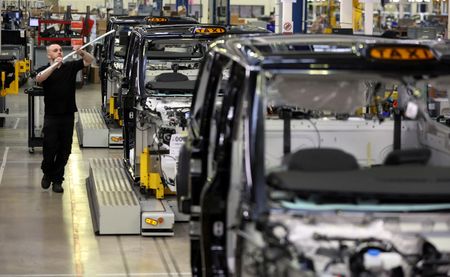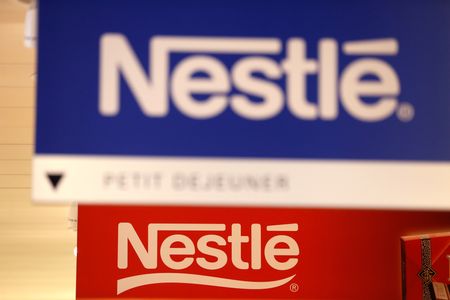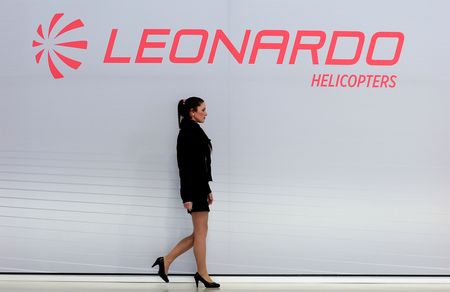By Alistair Smout, Andrew MacAskill and Andrea Shalal
LONDON/WASHINGTON (Reuters) -The United States and Britain will announce a deal to lower tariffs on some goods on Thursday, the first such agreement since U.S. President Donald Trump sparked a global trade war with universal levies.
In posts on Truth Social, Trump said he would hold an Oval Office news conference at 10 a.m. EDT (1400 GMT) on Thursday about a “full and comprehensive” trade agreement with Britain, but gave no further details about the pact.
The deal is likely to be narrow, with Britain securing a reduction in Trump’s new tariffs on cars and steel, the two sectors hardest hit.
In order to secure the carve-out, Britain could give some access to agricultural markets. The U.S. has also sought a cut to Britain’s digital sales tax, which affects America’s tech giants.
The governments could also set out an ambition to strike a broader trade deal, encompassing other sectors.
“Because of our long time history and allegiance together, it is a great honor to have the United Kingdom as our FIRST announcement,” Trump said. “Many other deals, which are in serious stages of negotiation, to follow!”
The United States has been under pressure from investors to strike deals to de-escalate its tariff war after Trump’s often chaotic policymaking upended global trade with friends and foe alike, threatening to stoke inflation and start a recession.
Top U.S. officials have engaged in a flurry of meetings with trading partners since the president on April 2 imposed a 10% tariff on most countries, along with higher rates for many trading partners that were then suspended for 90 days.
The U.S. has also imposed 25% tariffs on autos, steel and aluminium, 25% tariffs on Canada and Mexico, and 145% tariffs on China. U.S. and Chinese officials are due to hold talks in Switzerland on Saturday.
Jake Colvin, president of the National Foreign Trade Council in the U.S., welcomed the progress. “Businesses will be looking to see the extent to which an agreement removes President Trump’s tariffs, addresses longstanding U.K. irritants and provides guarantees against future tariff hikes.”
WARM RELATIONSHIP
British Prime Minister Keir Starmer, who has struck up a warm relationship with Trump since his centre-left Labour Party was elected in July, was due to make his own statement later on Thursday.
With the British economy struggling to grow, the tariffs had added to the pressure on his government.
Jaguar Land Rover paused its shipments to the U.S. for a month and the government was forced to seize control of British Steel to keep it operating.
While seeking a deal with the U.S., Britain had refused to lower its food standards, which are closely aligned with the European Union. However, Britain’s farming trade union has said that some U.S. producers who do not use growth hormones or antimicrobial washes could be given greater market access.
The status of the 10% “baseline” tariff was unclear, as was a threatened tariff on the pharmaceutical industry which could damage AstraZeneca and GSK.
News of an announcement sent shares in luxury carmaker Aston Martin up 10% while British retailers with operations in the U.S. including JD Sports and Primark owner AB Foods also rose.
TRADE TIGHTROPE
Starmer’s government has been seeking to build new trading relationships post-Brexit with the U.S., China and the EU without moving so far towards one bloc that it angers the others.
Economists and one FTSE 100 chief executive said the immediate economic impact of a tariff deal was likely to be limited but that trade agreements in general would help long-term growth. Britain struck a free trade agreement with India this week.
There are also domestic political risks.
Polling shows the government remains deeply unpopular, making any move to cut taxes on multi-national tech companies a big risk.
Britain’s digital service tax, levied at 2% of UK revenue for online marketplaces, search engines and social media platforms, was introduced in 2020 in response to an outcry about tax avoidance by big tech.
It was expected to raise about 800 million pounds ($1.1 billion) this year, but companies such as Google and Amazon have passed the cost on to customers through ad surcharges and higher selling fees, respectively.
“The American, Indian and other deals we can do will be really important to the long-term economic health of the UK but don’t expect them to result in overnight euphoria,” the CEO said, speaking on condition of anonymity.
(Additional reporting by James Davey and Paul Sandle; writing by Kate Holton; Editing by Toby Chopra and Gareth Jones)












